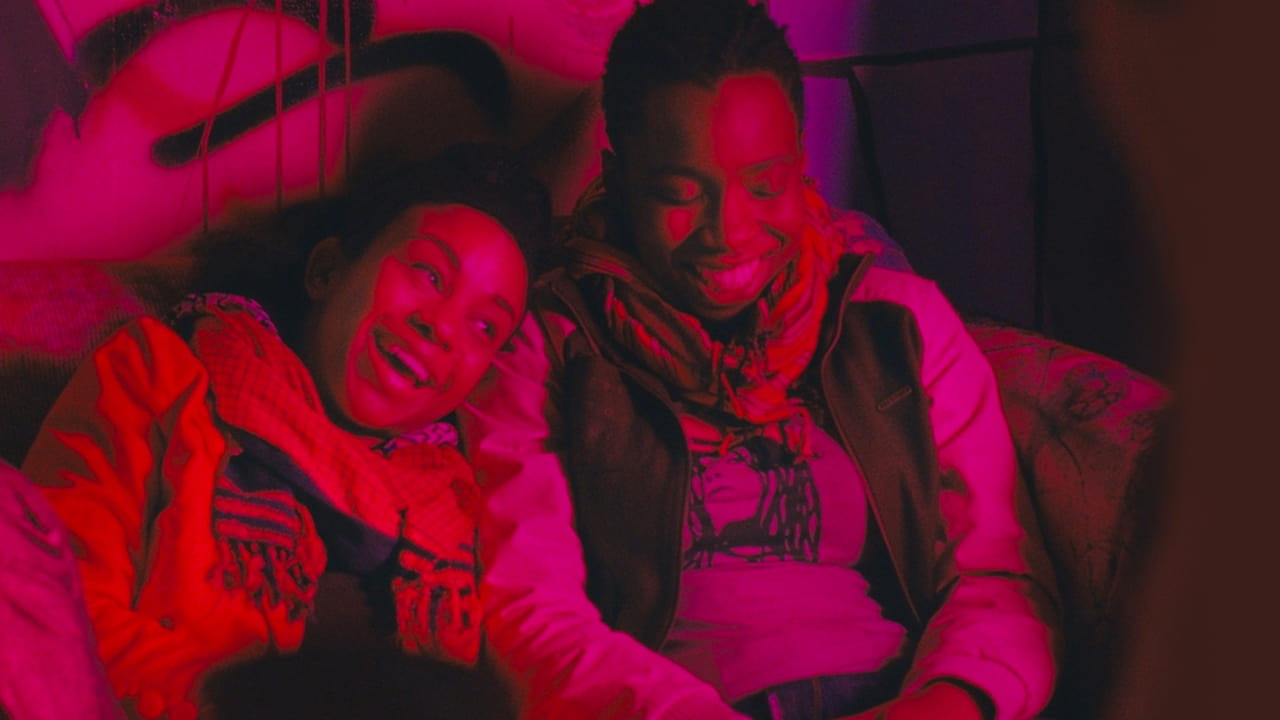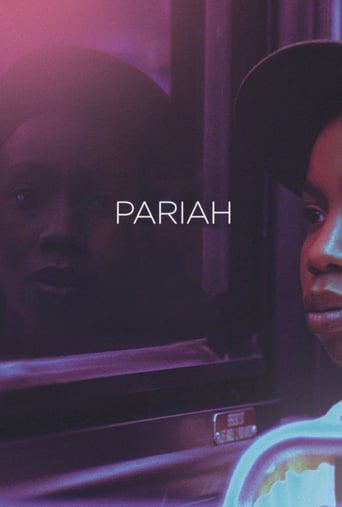

What a waste of my time!!!
... View MoreIt isn't all that great, actually. Really cheesy and very predicable of how certain scenes are gonna turn play out. However, I guess that's the charm of it all, because I would consider this one of my guilty pleasures.
... View MoreAfter playing with our expectations, this turns out to be a very different sort of film.
... View MoreOne of the film's great tricks is that, for a time, you think it will go down a rabbit hole of unrealistic glorification.
... View MoreIt was made in 2011 by Director Dee Rees. She had made a short movie on the same character and subject in 2007. Because that short film of 28 minutes won 8 international awards Dee Rees got inspired to make it a full length feature film. It took 4 years to get to the finish line to release the movie - the finances, the actors, the longer scripts and the rehearsals under tight budgetary constraints.But in the end, what we see is a beautiful coming to age film of a young teenage girl Alike (played fabulously by stunning beautiful Adepero Oduye - her first break) who evolves to find her sexuality and heart break within a dis-functional family (any surprises there?) with a religious strict Catholic mother Audrey (played to perfection by Kim Wayans) Audrey is a regular caring mother who is unhappy and scared about her daughter Alike's behavior as a tom-boy and about Alike's friend, thus she introduces Alike to one of her colleagues daughter - who invariably initiates Alike into a same-sex love and turns her down breaking Alike's heart into pieces. But with this experience Alike realizes her sexuality and during a confrontation with her parents - she declares "I am a lesbian" to the utter dis-belief of Audrey who beats her up.Alike leaves the house forever and joins a English literature program - breaking free and finding LOVE.*******Director Dee Rees who has written and directed this movie has worked very hard and it shows in every frame on the screen.The scenes are so well written that start at a point and lead to a final conclusion that takes the movie forward while introducing each character traits to fill in the gaps of the journey of Alike.No wonder the film bagged 15 international awards and 28 nominations in various categories - mainly director, actress (in main lead) and actress in supporting role and best movie.I do not like the movies with hand-held camera - but Dee Ree and her editor has done a brilliant job in cutting and editing the pieces with smoothness.The atmosphere of New York's black downtown area is taken superbly with the spaces in school and evening hang outs in clubs reflecting the real culture of new millennium teenagers.The cinematography and music are excellent. Watching Pariah today gives us the glimpse of coming to age of Hollywood cinema - which I am sure laid path to another gem of a movie Moonlight (coming to age boy's movie on gay subject) to win best movie Oscar at 2017 Academy Awards.I would highly recommend this movie for everyone who is sensitive to the LGBTQREI group. Take a few tissues - it is a emotionally powerful tear-jerker.We can't resist to be part of the journey of each characters and their flaws and still LOVE them... SUPERB.My rating for the movie is 7.25 out of 10
... View MoreIn her 2011 film, Pariah, director Dee Rees examines the events of a lesbian adolescent female named Alike's life as she grows up in Brooklyn with her family that refuses to acknowledge her sexuality. Rees uses an intimate film style to closely examine the film's characters and the relationships between them as they function in a society that still does not fully accept those that are gay. By analyzing Rees' use of cinematography and plot, there are certain conclusions to be made regarding the film's ability to accurately portray the often struggle-laden experience of teenager growing up, in addition to them being criticized and even socially rejected for being gay. From the start of the film, Alike's experience of growing up while also beginning the process of 'coming out' with her sexuality is demonstrated to be painstakingly discreet. This is shown in the scene in which Alike takes the bus home from the club and changes out of her tomboy-look into more effeminate clothing and puts on earrings, so as to prevent her mother from discovering her sexuality (Serwer 1). This film not only serves as an autobiographical entry of a young women entering into adulthood, but also a journey of acceptance by one's family and society in general. This film also embraces the "womanist" culture, in that the women being portrayed in the film support each other without the assistance of a man's strength and disregards 'girly' stereotypes (Reid 109). Alike serves as an example of a woman that rejects the traditional, Nuclear role of a dependent female that typically relies on the patriarchal power and knowledge of a male figure to extract her strength, which is particularly demonstrated on screen by her nearly completely absent father (Reid, 112). Rees examines several of the greatest enemies of adolescence, the parents, in that they not only reject Alike for being gay, but also perceive her sexuality as a reason to socially condemn her. Alike's parents' rejection of her throughout the film demonstrates the reoccurring phenomenon in films about growing up in which the parents and society in general do not accept the emerging individuality of teenagers (Reid, 115). For example, Alike's sexuality is dismissed as a phase by her parents, which serves as a blanket response to anything that the parents do not like the idea of and assume that their child will grow out of. This film also reveals a certain societal perspective on gay people, which is that they inadequate because of their sexuality, which results in them often keeping their sexuality discreet, just as Alike had (Serwer 1). However, Alike used others' lack of faith in her as a source of empowerment to finally come out with her sexuality and pursue her dreams confidently. The film Pariah examines the struggles faced by those growing up gay in a society that does not yet fully accept them for who they are, and especially not their sexuality. Rees uses a riveting yet realistic plot to share a story not commonly told with the audience in hopes to raise awareness about the negative side-effects of rejecting someone based on an element integral to their being, such their sexuality. This film serves as a type of empowerment for women of any sexuality in that it shows the remarkable strength of one that is almost completely rejected by her family, and yet finds the courage in herself to continue to follow her dreams of writing poetry. More importantly this film serves as a reminder that teenagers and their individual characteristics, including sexuality, should not be treated as anything less than something that is integral to their unique personality and what makes them who they are, whether others disagree with it or not.Work Cited: Reid, Mark. Redefining Black Film. Berkeley, University of California Press, 1993. Serwer, Andrew. "Film Review: "Pariah" and the Untold Stories in Black Cinema." Mother Jones (2011): 1. 28 Dec. 2011. Web. 16 Apr. 2017.
... View MoreQuite simply: You have a 17 year old Brooklyn Teenager struggling to find herself (in a world around her full of labels).The Journey she takes is compelling and the performances are stellar, true and heartfelt (Kim Wayans performance is a huge surprise). It is very rare that such a complex and moving film can so deeply affect you, yet maintain such an up close and personal relationship (between all the characters) and that's why (along with the performances) this Film works! Without any extra hyperbole, this is , quite simply, one of the Best Films of the last 10 years!
... View MoreA difficult subject for most families and the Black Community has it really tough. This is a coming of gay age movie, packs a punch. The movie opens with tough rap lyrics and with the uncomfortableness of that you are transported into what Alike feels, unsure. Alike knows she is, but is a virgin, and at the point we meet her she wants more than just knowing, she wants a relationship. Her best friend, out and rejected by her own mother (and Alike's mother), she tries to help Alike navigate this landscape. The movie introduces us to characters we've not seen before. Alike's father, Arthur (brilliantly played by Charles Parnell), in this unhappy marriage, must provide for the daughters he loves and the wife he hates. He wrestles knowing there is something is not right with Alike. He makes his choice to love her. Audrey (Kim Wayans), Alike's mother, struggles because she knows, but doesn't want to know. Her disgust of the lifestyle cannot be condoned or tolerated. Kim Wayans, captures this Black mother at her worst, she is raw, sad, and we can even empathize with her. Her decision in the end without compromise, her daughter is a stranger to her who she will pray for. Adepero Oduye as Alike, is vulnerable, open, sad, and in the end POWERFUL. She makes a choice and is willing to live with that choice. When Alike tells her father "I am not running, I am choosing", sums it all up. Choose to live, with who and what you are.
... View More